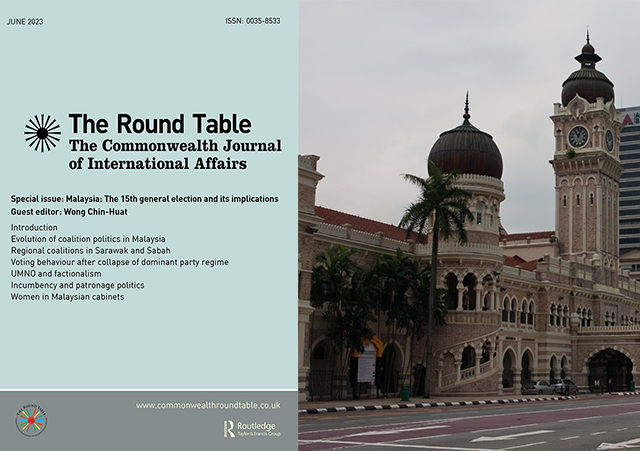 Malaysian parliament building. [photo: Alamy]
Malaysian parliament building. [photo: Alamy]
[This is an excerpt from an article in The Round Table: The Commonwealth Journal of International Affairs.]
While many commentators have focused on the hung parliament outcome produced by Malaysia’s 15th General Election (GE15), the candidate selection process in each political party or coalition did not receive the attention it deserves.
If democracy is likened to a market where mainstream parties are the major suppliers, customers (voters) are left with a poor choice if the major suppliers provide only defective goods. Notwithstanding market competition, democracy may be compromised by bad supply.
Where descriptive representation is concerned, the goal to achieve 30% women’s representation in Dewan Rakyat was impossible from nomination day onwards, when none of the mainstream political coalitions offered at least 30% female candidates on their slates. The same applies to the representation in terms of ethnicity, age (youth), social classes and other demographic categorisation.
Malaysia: The 15th general election and its implications – Special edition
Research Article – Voting behaviour after the collapse of a dominant party regime in Malaysia: ethno-religious backlash or economic grievances?
Voting behaviour after the collapse of a dominant party regime in Malaysia: ethno-religious backlash or economic grievances?
Beyond group representation, the process of selecting individual candidates is opaque and arbitrary, often reflecting only the preferences of parties’ or coalitions’ top leadership.
Unlike the Conservatives and Labour in the UK, Malaysian parties provide only limited and general information concerning candidate selection in their constitution or governing documents. There are no guidelines or criteria to decide the retention or replacement of incumbents, or the nomination of new candidates, let alone the participation of party members or the general public in candidate selection.
Such lacunae lead to the concentration of power in the party leadership and inevitably also to accusations of personal or factional favouritism, as illustrated in the cases of the United Malays National Organisation (UMNO), People’s Justice Party (Parti Keadilan Rakyat, PKR) and Democratic Action Party (DAP).
In UMNO, the list of potential candidates is to be submitted by division-level committees to state-level liaison committees for ‘consideration’ and finally the Supreme Council for ‘confirmation’. However, if the party President opines that the candidates proposed do not meet certain criteria, then this process is subject to ‘renegotiation’, even though the constitution does not explicitly describe what those criteria are.
The ambiguity about the extent of President’s powers and the process’s timelines give the President enormous control and influence on the party and allow him to be the de facto sole decision-maker. In practice, according to UMNO Deputy President Mohamad Hassan, even names not included in the lists submitted by state-level liaison committees might be evaluated by the high command.
UMNO President Zahid Hamidi proposed the selection criteria to be WALI – Winnable, Acceptable and Likeable Incumbents. Four Ministers and three Deputy Ministers in the Ismail Sabri Government were dropped for being seen as Prime Minister Ismail’s loyalists or President Zahid’s detractors, even though some of them were WALI. It is proven by UMNO’s defeat in their strongholds (as illustrated in four selected constituencies below).
Likewise in PKR, some reputable MPs who intended to recontest, like Maria Chin and Sivarasa Rasiah, were dropped without convincing justifications, suspected to be casualties of party infighting.
DAP candidates were decided by a five-person committee instead of its Central Executive Committee, which is given sole prerogative on this matter by Clause XII(9)(f) of the party’s Constitution. Two incumbents – Wong Tack (Bentong) and Charles Santiago (Klang) – were dropped despite their expressed intention to contest.
DAP’s Secretary General and a member of the five-person committee, Anthony Loke, defended the dropping of Wong Tack with an opinion poll conducted in Bentong, akin to a de facto but unannounced primary, which showed Wong to be unpopular.
In Klang, Santiago was dropped reportedly on grounds of internal party arrangements and of him not holding any party position, and despite evidence of his popularity over those chosen to replace him in an opinion poll commissioned by local residents.
Opaque and arbitrary candidate selection affects parties/coalitions, politicians and democracy itself. Parties may lose their otherwise safe seats when the dropped incumbents refuse to operate long-established and familiar election machinery, as UMNO experienced in Tanjung Karang and Ketereh; those dropped may even join a rival camp to compete against their original party as UMNO discovered to its cost in Arau and Maran.
Chang-Xi Wo is a Research Analyst, UN Sustainable Development Solutions Network – Asia Headquarters, Sunway University, Malaysia.



